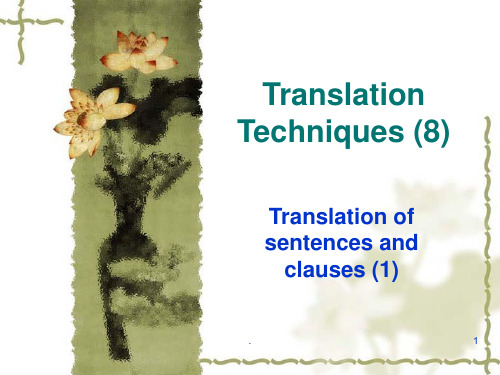汉英翻译第十二讲隐喻的译法19页PPT
合集下载
英汉翻译幻灯片

Elements involved in the process of translating
Author of ST—ST—Translator—TT—Readers of TT
Elements involved in the process of translating
Intermediate information receiver
Criteria of translation
译者不但要求达义,并且要以传神为目的,译 文必须忠实于原文之字神句气与言外之意。 ――林语堂
以效果而论,翻译应像临画一样,所求的不在 形似,而是神似。 ――傅雷
Criteria of translation
文学翻译的最高标准可以说是“化”。把作品从 一国文字转变成另一国文字,既不能因语言习惯 的差异而露出生硬牵强的痕迹,又能完全保存原 作的风味,那就算得入于“化境”。 ――钱钟书
真有灵感的译文,像投胎重生的灵魂一般,令人 觉得是一种“再创造”。 ――余光中
Criteria of translation
We expect approximate truth in translation…what we want to have is the truest possible feel of the original. The characters, the situation, the reflection, must come to us as they were in the author’s mind and breast, not necessarily by precisely as he had them on his lips.
Chinese-English Translation
《汉英翻译》PPT课件

❖ Multi-media aided.
.
2
VI. Teaching Procedures:
❖ Step 1 Comments on the assignment. (Omitted.)
❖ Step 2 Translation of Sentences
❖ 英、汉两种语言在语法、句子结构等方面有 着很大的差异,在翻译时我们为了使译文通 顺流畅,符合译语的表达习惯,我们可以改 变原来句子的语序或结构, 重新组织句子。 一般说来句子有以下几种翻译方法。
❖ 4. Don’t hesitate to come when you need help.
什么时候需要帮助, 只管来找我。(状语从句换序)
.
4
II. Division (分译)
❖ A. Put a word or a phrase in English into sentences in Chinese.
❖ 2. I tried vainly to put the p起来。(分译状语)
❖ 3. The computer can give Mary the right lesson for her: neither too fast nor too slow. 计算机能给玛丽上课,上得恰到好处, 既不太快, 也不太 慢。(分译定语)
❖ 3. That day, the President had an interview with her father. Her father was going to the moon by space-shuttle.
那天, 总统会见了她的父亲, 因为她的父亲即将乘航天 飞机去登月。
❖ 4. She is very busy at home. She has to take care of the children and does the kitchen work.
汉英翻译修辞格翻译18页PPT

谢谢!
36、自己的鞋子,自己知道紧在哪里。——西班牙
37、我们唯一不会改正的缺点是软弱。——拉罗什福科
xiexie! 38、我这个人走得很慢,但是我从不后退。——亚伯拉罕·林肯
39、勿问成功的秘诀为何,且尽全力做你应该做的事吧。——美华纳
40、学而不思则罔,思而不学则殆。——孔子
汉英翻译修辞格翻译
51、没有哪个社会可以制订一部永远 适用的 宪法, 甚至一 条永远 适用的 法律。 ——杰 斐逊 52、法律源于人的自卫本能。——英 格索尔
53、人们通常会发现,法律就是这样 一种的 网,触 犯法律 的人, 小的可 以穿网 而过, 大的可 以破网 而出, 只有中 等的才 会坠入 网中。 ——申 斯通 54、法律就是法律它是一座雄伟的大 夏,庇 护着我 们大家 ;它的 每一块 砖石都 垒在另 一块砖 石上。 ——高 尔斯华 绥 55、今天的法律未必明天仍是法律。 ——罗·伯顿
汉英翻译分析解析PPT课件

❖Newmark→ translation scholar and
researcher from GB
22
23
❖ He ( one who speaks or writes in a foreign language) will be “ caught out “every time, not by grammar, which is probably suspiciously better than an educated native, not by his vocabulary, which may well be wider, but by his unacceptable or improbable collocations.
Translation ❖ Shang Hai Foreign Language Education
press
5
❖ 2) References ❖ A collegiate Course in Chinese-English
translation ❖ Shang Dong University press
❖ 1) T must comply with E grammar
❖
↓
❖
↓
❖
Three major structures
10
❖
Structure one
a. 主-系-表结构 (S+V+P)
Examples:
a) 人类在地球上已存在多久了?
How long has man been on earth?
17
❖c) 主-谓-宾(SVO)
1)我昨天看了一部电影。 2)你读过这个故事吗? 3)他们很容易找到他们的家。
researcher from GB
22
23
❖ He ( one who speaks or writes in a foreign language) will be “ caught out “every time, not by grammar, which is probably suspiciously better than an educated native, not by his vocabulary, which may well be wider, but by his unacceptable or improbable collocations.
Translation ❖ Shang Hai Foreign Language Education
press
5
❖ 2) References ❖ A collegiate Course in Chinese-English
translation ❖ Shang Dong University press
❖ 1) T must comply with E grammar
❖
↓
❖
↓
❖
Three major structures
10
❖
Structure one
a. 主-系-表结构 (S+V+P)
Examples:
a) 人类在地球上已存在多久了?
How long has man been on earth?
17
❖c) 主-谓-宾(SVO)
1)我昨天看了一部电影。 2)你读过这个故事吗? 3)他们很容易找到他们的家。
英汉翻译中的分译课件

Division in E-C Translation
英汉翻译之分译法
英语重形
01
汉语重意
02
英语造句多用形合法(hypotaxis),
03
汉语造句多用意合法(parataxis)
04
英语主要以词汇为纽带,汉语主要以逻辑为纽带;英语造句主要借助连词、关系代词等形式骨架,汉语造句主要凭借隐含的逻辑将句子的各个部分统一起来。
The fire started during the workmen’s dinner hour.
工人们吃饭时,发生了火灾。
With all his faults, I like him.
尽管他有种种缺点,我还是喜欢他。
The popular reaction to the debt problem particularly in the United States, was try to punish the banks for having lent money to developing countries rather than to neighborhood companies.
小时候有一次去爱因斯坦家作客,由于我很腼腆,他就对我说:“我有样东西给你看。”于是我便感到不拘束了。
副词
01
Frankly, are you interested in going?
02 though they are the providers of food to the remaining mankind and constitute lifeline for the urban dwellers, yet the interests of inhabitants in many rural areas continue to be consigned to revolting neglect. 尽管他们生产粮食养活了世界的另一部分人,维系着城镇居民的生命线,然而,许多农业人口的利益至今仍继续遭受令人厌恶的冷漠忽视。说起来荒谬,但这却是事实。
英汉翻译之分译法
英语重形
01
汉语重意
02
英语造句多用形合法(hypotaxis),
03
汉语造句多用意合法(parataxis)
04
英语主要以词汇为纽带,汉语主要以逻辑为纽带;英语造句主要借助连词、关系代词等形式骨架,汉语造句主要凭借隐含的逻辑将句子的各个部分统一起来。
The fire started during the workmen’s dinner hour.
工人们吃饭时,发生了火灾。
With all his faults, I like him.
尽管他有种种缺点,我还是喜欢他。
The popular reaction to the debt problem particularly in the United States, was try to punish the banks for having lent money to developing countries rather than to neighborhood companies.
小时候有一次去爱因斯坦家作客,由于我很腼腆,他就对我说:“我有样东西给你看。”于是我便感到不拘束了。
副词
01
Frankly, are you interested in going?
02 though they are the providers of food to the remaining mankind and constitute lifeline for the urban dwellers, yet the interests of inhabitants in many rural areas continue to be consigned to revolting neglect. 尽管他们生产粮食养活了世界的另一部分人,维系着城镇居民的生命线,然而,许多农业人口的利益至今仍继续遭受令人厌恶的冷漠忽视。说起来荒谬,但这却是事实。
汉英笔译基础教程第12章 成语翻译

❖ A Dictionary of American Idioms对Great oaks from little acorns grow. 注释如下:As great oak trees grow from tiny acorns, so many great people or things grew from a small and unimportant beginning. (正如巨大的橡树是从微小 的橡子成长起来的一样,许多大人物或大事都是从微小而 不重要的开端成长发展起来的。)
❖ “合抱之木,生于毫末”与 Great oaks from little acorns grow. 形象和喻义都比较一致,基本上对应。 而“九层之台,起于累土”;“千里之行,始于足下”也 可以用Great oaks from little acorns grow.来翻 译,因为虽然它们形象不同,但是喻义基本相同.
❖ 本教材采用广义成语的定义。
12.2.汉语成语与英语idiom概念对比
❖ 12.2.1.四字成语与狭义 Idiom ❖ 《汉英词典》将成语译为set phrase; idiom。 前者相当于“定型
短语”, 后者相当于“习语”。英语中这两个词比较接近成语的意 义,尤其是后者,经常作为成语的对应词。 ❖ 但英语的idiom与汉语成语也并非百分之百对应。Oxford Advanced Learner’s Dictionary of Current English 的解 释把idiom分成两义:(1)Language of a people or country; specific character of this(一个民族或国家的语言,这种语言 的特殊之点);(2)(gram)succession of words whose meaning is not obvious through knowledge of the individual meanings of the constituent words but must be learnt as a whole (连串之词表示其整体意义而不表 各词单个意义者)。以上两义中只有第二义相当于成语。英语idiom 比较强调的是语言的特殊用法(脱离字面意思的深层含义),即习语 性,而汉语成语则更强调言简意赅,强调出处和定型。有些四字词组 只有字面意义而没有深层的习语含义,例如“幸免于难”、“力不从 心”、“伶牙俐齿”等,就似乎不大符合idiom的标准。(陈文伯 2005) ❖ 因此,从上述简略对比可以看出,汉语四字成语与该牛津辞典所定义 的英语idiom有同有异,部分对应。
❖ “合抱之木,生于毫末”与 Great oaks from little acorns grow. 形象和喻义都比较一致,基本上对应。 而“九层之台,起于累土”;“千里之行,始于足下”也 可以用Great oaks from little acorns grow.来翻 译,因为虽然它们形象不同,但是喻义基本相同.
❖ 本教材采用广义成语的定义。
12.2.汉语成语与英语idiom概念对比
❖ 12.2.1.四字成语与狭义 Idiom ❖ 《汉英词典》将成语译为set phrase; idiom。 前者相当于“定型
短语”, 后者相当于“习语”。英语中这两个词比较接近成语的意 义,尤其是后者,经常作为成语的对应词。 ❖ 但英语的idiom与汉语成语也并非百分之百对应。Oxford Advanced Learner’s Dictionary of Current English 的解 释把idiom分成两义:(1)Language of a people or country; specific character of this(一个民族或国家的语言,这种语言 的特殊之点);(2)(gram)succession of words whose meaning is not obvious through knowledge of the individual meanings of the constituent words but must be learnt as a whole (连串之词表示其整体意义而不表 各词单个意义者)。以上两义中只有第二义相当于成语。英语idiom 比较强调的是语言的特殊用法(脱离字面意思的深层含义),即习语 性,而汉语成语则更强调言简意赅,强调出处和定型。有些四字词组 只有字面意义而没有深层的习语含义,例如“幸免于难”、“力不从 心”、“伶牙俐齿”等,就似乎不大符合idiom的标准。(陈文伯 2005) ❖ 因此,从上述简略对比可以看出,汉语四字成语与该牛津辞典所定义 的英语idiom有同有异,部分对应。
汉英翻译翻译技巧PPT课件

get cold feet 胆怯
mend one's fences 改善关系
谦虚态度 modesty 发展过程 development
稳定性 stability
灵敏性 sensibility
无知的表现 innocence 同情心理 sympathy
鸡毛蒜皮 trifling
单枪匹马 all by oneself
LOG原文中抽象或者比较抽象的单词、词组、 成语或句子用具体或者是比较具体的单词、词组、成语或者句 子来进行翻译,从而消除或降低语言差别给翻译带来的损失。
如:transportation 运输工具 translation 翻译作品
advertisement 广告资料 government 政府官员
LOGO
在翻译过程中把原文中抽象或者比较抽象的单词、词组、
成语或句子用具体或者是比较具体的单词、词组、成语或者句 子来进行翻译,从而消除或降低语言差别给翻译带来的损失。
如: 大吵大闹 raise the roof 公开认错 stand in the white sheet 有花不完的钱 have enough money to burn 话中有话 with the tongue in the cheek 机敏 keep one's eyes on the ball 坚决反对 put one's foot down; set one's face against 截然不同 oil and vinegar 鲁莽的人 a bull in a china shop 告发 put the finger on 甘苦差事 hold (carry) the baby 反应快 think on one's feet 保密 keep sth under one's hat
汉英翻译技巧分析解析PPT课件

汉英翻译技巧
1
标题添加
点击此处输入相 关文本内容
前言
点击此处输入 相关文本内容
标题添加
点击此处输入相 关文本内容
点击此处输入 相关文本内容
2
千万不要被词的表面所迷惑
• “上课了?” • (Have you) Just finished your
class? • How’s your first class? • Has the bell gone?/Am I late
for combat.
7
• (7) 可是在其他地方,情况却完全两样了。
• But the picture outside this place is
quite another story.
• (8) 我们可能去那儿,那得看情况而定。
• We may go there, but that depends. (…it all depends.)
• (2) 多少事,从来急;天地转,光阴迫。一万年 太久只争朝夕。
• So many deeds cry out to be done,
• And always urgently,
• The world rolls on,
• The peasants have done a great many
things…the peasants under the
leadership of the peasant associations have the following
fourteen great achievements to their
4
Hale Waihona Puke • The four or five waiters were busy rushing from one to another serving
1
标题添加
点击此处输入相 关文本内容
前言
点击此处输入 相关文本内容
标题添加
点击此处输入相 关文本内容
点击此处输入 相关文本内容
2
千万不要被词的表面所迷惑
• “上课了?” • (Have you) Just finished your
class? • How’s your first class? • Has the bell gone?/Am I late
for combat.
7
• (7) 可是在其他地方,情况却完全两样了。
• But the picture outside this place is
quite another story.
• (8) 我们可能去那儿,那得看情况而定。
• We may go there, but that depends. (…it all depends.)
• (2) 多少事,从来急;天地转,光阴迫。一万年 太久只争朝夕。
• So many deeds cry out to be done,
• And always urgently,
• The world rolls on,
• The peasants have done a great many
things…the peasants under the
leadership of the peasant associations have the following
fourteen great achievements to their
4
Hale Waihona Puke • The four or five waiters were busy rushing from one to another serving
